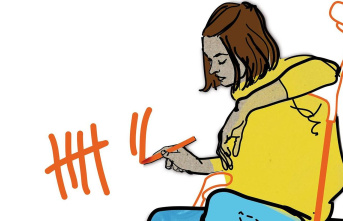A dispute has broken out in the Brandenburg Kenya coalition over more police powers in the fight against domestic violence. A draft law by Interior Minister Michael Stübgen (CDU) provides, among other things, that police officers can use a bodycam to record what is happening due to domestic violence and that emergency doctors are released from their medical confidentiality in these cases. For potential violent and sex offenders, electronic ankle bracelets should also be possible in high-risk cases. In the future, offenders should not only be able to be expelled from the shared apartment for ten days, but for up to two weeks.
This law is being blocked by Social Affairs Minister Ursula Nonnemacher (Greens), Stübgen complained in an interview with the German Press Agency. The expansion of police powers and the release of emergency doctors from their duty of confidentiality are necessary, however, because women are often afraid of reporting violent partners. This makes it more difficult to prosecute the perpetrators. "We have to act because the number of cases of domestic violence against women has risen sharply in recent years," said the minister.
Green Minister Nonnemacher referred to the coalition agreement between Red, Black and Green when she rejected the draft law. "In the coalition agreement, we agreed that the state government is not planning any comprehensive amendments to the police law," she said when asked. However, the draft law is intended to change various laws, including the police law, which has so far not allowed the use of bodycams in living spaces.
The protection of women and children against violence is a very important concern of the state government, said Nonnemacher. "But this serious issue is not suitable for expanding the powers of the police more and more," emphasized the minister. The use of bodycams in private homes is a fundamental decision. "The Basic Law protects the inviolability of the home," emphasized Nonnemacher. "And under the current bill, the expansion of bodycam use is not designed to protect women or victims of domestic violence."
The lifting of medical confidentiality in the emergency doctor service is also a complex issue. "Medical confidentiality is a valuable asset and the basis for the special relationship of trust between doctor and patient," emphasized the minister, who is herself a specialist in internal medicine.
In 2019, the police in Brandenburg counted 4,371 crimes related to domestic violence. In the corona pandemic, the number increased drastically in 2020 to 5235 cases and then fell back somewhat in 2021 to 5073 cases.












